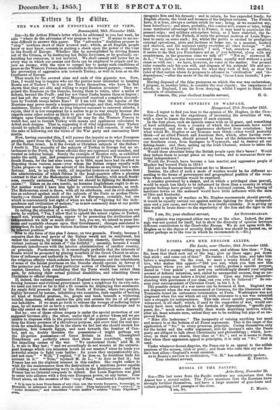UNDUE SEVERITY IN WARFARE.
Hampstead, 27th Norember 1855.
Sin—I regret to find you lean to the opinion of Mr. Hughes, in the Cam- bridge Essays, as to the expediency of increasing the severities of war, with a view to lessen the frequency of such contests. In the first place, such an opinion comes with an ill grace, and something of hard selfishness, from a country of which the homesteads have never been exposed, and are to all appearance sheltered from retaliation : but what would Mr. Hughes or any humane man think—what would posterity think—of an allied French and American fleet, which, after having over- come our naval forces, should proceed to burn all the defenceless towns on our Southern coast, from Ramsgato to Weymouth, and to destroy all our fishing-boats ; and then, sailing up the Irish Channel, reduce to ashes the docks and town of Liverpool ?
Would these atrocities bring the British people upon their tnees ? Would they induce them to accept peace on any terms, and to surrender their na- tional independence ? - Would the French have become a less martial and aggressive people if Blucher had burned Paris in 1814 ?
Did not the Russians themselves set fire to Moscow ?
Besides, the effect of such a mode of warfare would be far different ac- cording to the forms of government and geographical position of the emu- tries where such severities would be exercised.
A country governed by a despot, and in which a privileged class prevail, would be much less likely to be influenced by them than a country in which popular feelings have greater weight. In a national contest, the burning of maritime towns on the seaboard would have little influence with the men of Ohio and Kentucky. If such a system of warfare as Mr. Hughes recommends should prevail, it would be equally carried out against nations fighting for their independ- ence and a just cause, and would thus be a double calamity. It is giving up this world to brute force—to the superiority of the lion and the tiger in the forest.
[No opinion was expressed either one way or the other. Indeed, the pas- sage was not quoted for itself, but to show the diversity of opinion between different contributors to the Cambridge Essays. We do not agree with Mr. Hughes as to the degree of severity with which war should be carried on, or rather perhaps as to the tone in which he recommends it. —En.]


























 Previous page
Previous page